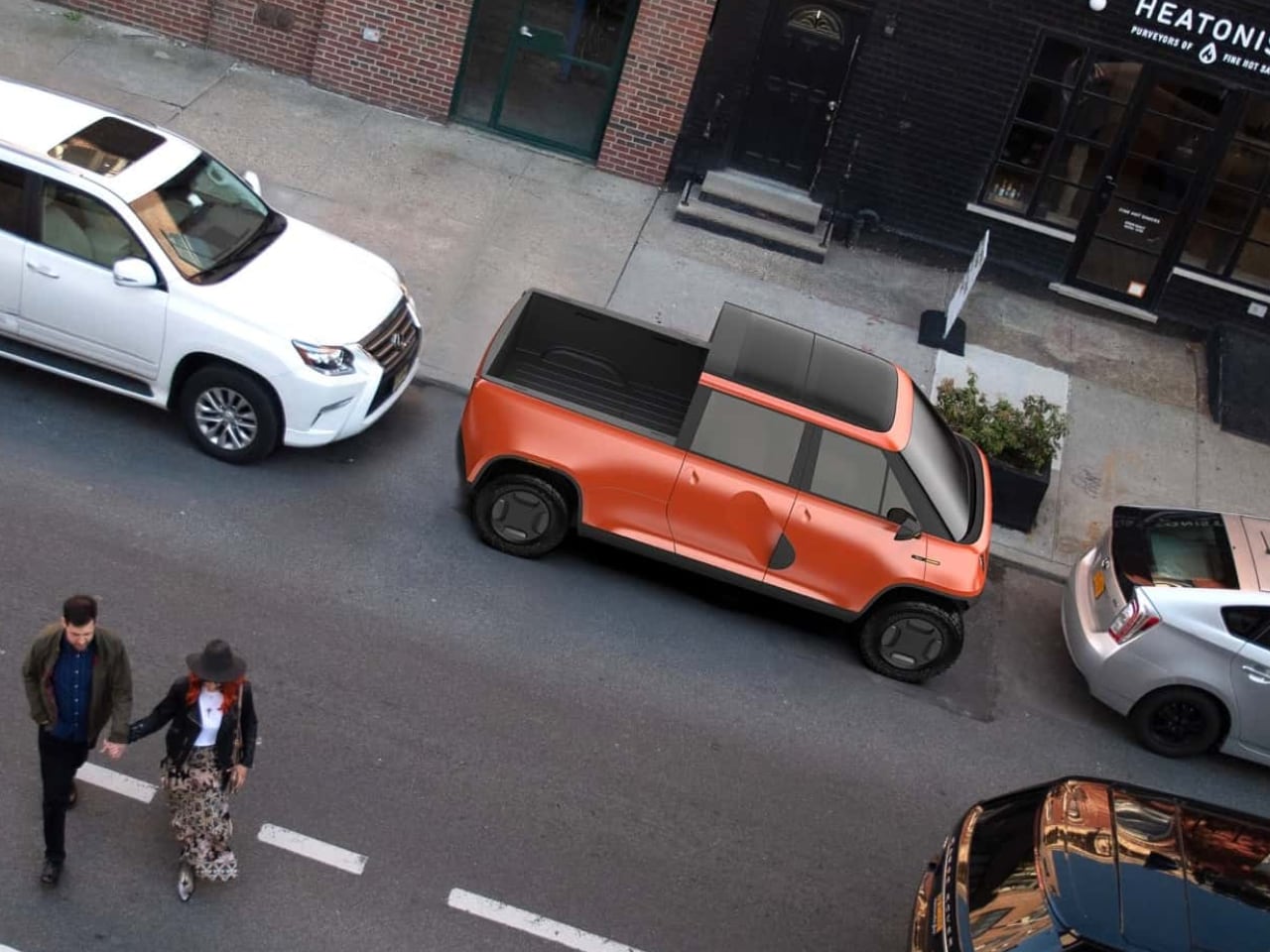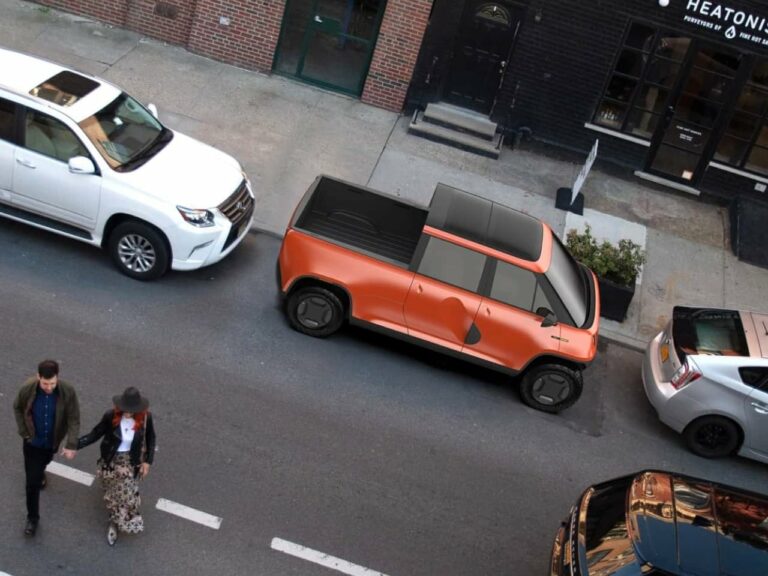Ever tried navigating a crowded city parking lot in a full-size pickup? It’s akin to threading a needle while wearing oven mitts. This is why the new Telo MT1 electric truck feels like such a welcome change. This compact powerhouse brings impressive capability to a vehicle roughly the size of a Mini Cooper, potentially becoming the urban truck many have been waiting for.
Designer: Telo
Small Truck, Big Ideas
The genesis of the MT1 began with a simple question: Why are American trucks so immense? Jason Marks, Forrest North, and Yves Behar, the founders of Telo Trucks in 2022, observed the oversized pickup market and identified an opportunity. What if they could create a truck that genuinely fits in a standard parking spot, yet still handles hauling needs?
“Most truck owners rarely utilize the full bed capacity,” Marks explained during a recent prototype unveiling. “They mostly need to move furniture occasionally, transport bikes, or haul supplies for weekend projects. We designed the MT1 for practical, real-world use.”
The numbers paint a clear picture: At a mere 152 inches long, this electric pickup is five feet shorter than a Toyota Tacoma. Despite its compact dimensions, it comfortably seats five adults and features a proper 5-foot bed. This presents an efficient and clever design.
Clever Solutions, Not Rocket Science
The MT1’s functionality stems from thoughtful design rather than complex technology. Consider the midgate, for example. Need to transport something longer than the bed allows? Simply fold down the wall between the cabin and bed. You can now accommodate full sheets of plywood or a pair of surfboards. While not entirely novel (the old Chevy Avalanche employed a similar concept), its implementation here is sensible. Then, there’s what Telo calls the “Monster Tunnel” – essentially a large storage space extending under the truck from side to side, ideal for tools, sports gear, or items needing discreet transport. Again, this isn’t groundbreaking, but it contributes genuine utility.
Thanks to several smart design choices, the cabin itself offers a surprisingly spacious feel. The seats feature a floating design, allowing rear passengers to slide their feet underneath. Plus, a cab-forward layout maximizes interior space. During a recent demonstration, a 6’5″ journalist comfortably occupied both front and rear seats, an impressive feat for such a small truck.
Practical Power
Under the skin, the MT1 provides two straightforward choices: a single-motor rear-wheel drive system generating 300 horsepower or a dual-motor all-wheel drive version supplying 500 horsepower. Either option delivers significant performance; the dual-motor model accelerates from 0 to 60 mph in approximately 4 seconds.
Battery options are equally uncomplicated: a standard pack provides a range of about 260 miles, while a larger 106-kWh battery extends the range to over 350 miles. Fast charging replenishes the battery from 20% to 80% in roughly half an hour. The truck weighs around 4,400 pounds – heavier than a car but considerably lighter than other electric trucks, which often tip the scales at 6,000-7,000 pounds. This lighter weight contributes to enhanced range and handling.
Perhaps most impressive is the MT1’s practical functionality. It can tow up to 6,600 pounds and handle a payload between 1,600 and 2,000 pounds in its bed, indicating significant utility from such a small package.
Built Smart
Telo didn’t revolutionize the wheel with the MT1’s construction, but they made intelligent decisions. The chassis combines aluminum with strategically placed carbon fiber in areas where space is limited, like the front firewall and wheel wells. This approach keeps the weight down while maintaining structural integrity.
The interior design feels modern without being overly flashy. It includes screens for instrumentation and infotainment, but also features physical controls for frequently used functions. Materials such as cork and other sustainable options are incorporated, though the general aesthetic prioritizes practicality over ostentation. With 10 inches of ground clearance, the MT1 can navigate rough roads and lightweight trails without issues. While not designed for rock crawling, it will efficiently transport you and your gear to a remote campsite.
From Drawing Board to Driveway
On March 6, 2025, Telo revealed its initial working pre-production prototype, a significant milestone for any automotive startup. To build these early models, Telo has partnered with Aria Group in California. Aria’s experience in vehicle creation for movies and limited production runs makes them suitably equipped for Telo’s current needs.
However, the journey to your driveway still presents challenges. Telo plans to deliver the first customer trucks in 2026, beginning with a production run of approximately 100 vehicles that year. According to company statements, they will need to sell around 5,000 annually to achieve profitability. Currently, about 5,000 individuals have placed a $152 reservation fee (a clever nod to the truck’s length in inches). While promising, this remains modest compared to reservation numbers for trucks from established brands.
What It’ll Cost You
Let’s discuss the financials. The base single-motor MT1 with the standard battery starts at $41,520. Opt for the dual-motor setup, and you’ll add about $4,500. The larger battery incurs an additional cost of $3,980. Therefore, a fully loaded dual-motor version with the long-range battery will be just under $50,000.
While not inexpensive for a small truck, this price point is roughly half of what you’d pay for a Tesla Cybertruck. It also comes in less expensively compared to Ford’s E-Transit commercial EV, which starts at around $51,000 and offers less range. Federal tax incentives may further reduce the cost for some buyers.
Telo’s target customer is someone who resides in the city but seeks weekend getaways – the urban dweller who occasionally needs to transport goods but wants to avoid driving an oversized vehicle daily. This niche currently has few options in the U.S. market.
The Real-World Test
Initial test drives of the prototype have yielded encouraging results. The MT1’s compact size makes it easy to maneuver in tight spaces; you can effortlessly see all four corners from the driver’s seat, a rarity in modern trucks. The electric powertrain delivers immediate responsiveness, and the low center of gravity, thanks to the floor-mounted battery, contributes to a planted feel on the road.
“It drives like a car but performs like a truck,” noted one test driver. “You forget it’s a pickup until you need to haul something.”
The suspension balances comfort with capability – it feels comfortable for daily commutes while remaining firm enough to handle a loaded bed. Regenerative braking allows for predominantly one-pedal driving, simplifying stop-and-go traffic.
Bumps in the Road
Of course, bringing a new vehicle to market is never without hurdles. Telo faces significant challenges before the MT1 becomes a common sight on our roads. Funding is paramount. While Telo has secured initial funding, car manufacturing requires substantial capital. The company has not fully revealed its plans for financing full-scale production. Building a sales and service network also presents a considerable challenge for the startup.
Safety concerns also exist. Some question whether such a compact truck can adequately protect occupants in a collision with larger vehicles. Telo asserts it is conducting crash tests and has designed specific crumple zones, but it needs to demonstrate the MT1’s safety record to reassure skeptical buyers. Then, there’s the preference for large trucks among Americans. Changing this mindset may prove the most challenging hurdle of all, despite the practical benefits.
A Truck That Makes Sense
The Telo MT1 doesn’t aim to be all things to all people. It won’t replace heavy-duty work trucks or appeal to those who equate vehicle size with personal social status. Instead, it provides a sensible alternative for individuals who need occasional utility without the everyday disadvantages of driving an oversized vehicle.
“We’re not suggesting everyone should drive a small truck,” says Marks. “We’re simply stating that for many people, particularly those in urban settings, the MT1 presents a more logical choice than the behemoth pickups dominating today’s market.”
If Telo can successfully navigate the difficult automotive manufacturing landscape and bring the MT1 to market as planned, they could potentially tackle several issues concurrently: urban traffic congestion, parking scarcity, excessive resource consumption, and the lack of suitably sized utility vehicles in America. The MT1 feels designed with consideration for how people live, not for how they imagine living. It’s practical, capable, and sensibly sized. Whether that’s sufficient to succeed in a market often driven by image over practicality remains to be determined – however, the MT1 deserves an opportunity to prove itself on our roads.
As one journalist expressed after testing the prototype, “It just makes sense. And in the truck world, that feels surprisingly fresh.”




